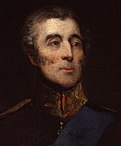United Kingdom general election, 1831
|
|
|||||||||||||||||||||||||||||||||||
|
|||||||||||||||||||||||||||||||||||
|
|||||||||||||||||||||||||||||||||||
|
|
|||||||||||||||||||||||||||||||||||
| Colours denote the winning party | |||||||||||||||||||||||||||||||||||
|
|||||||||||||||||||||||||||||||||||
The 1831 general election in the United Kingdom saw a landslide win by supporters of electoral reform, which was the major election issue. As a result, it was the last unreformed election, as the Parliament which resulted ensured the passage of the Reform Act 1832. Polling was held from 28 April to 1 June 1831. The Whigs won a majority of 136 over the Tories, which was as near to a landslide as the unreformed electoral system could deliver. As the Government obtained a dissolution of Parliament once the new electoral system had been enacted, the resulting Parliament was a short one and there was another election the following year. The election was the first since 1715 to see a victory by a party previously in minority.
The ninth United Kingdom Parliament, which had been elected in 1830, did not have a stable majority for the Tory government of the Duke of Wellington: the best estimate is that it had 310 supporters, 225 opponents and 121 doubtful. After a series of defeats, on 15 November 1830 Henry Parnell's motion for an inquiry into the civil list was carried by 233 to 204; this defeat surprised Wellington and his cabinet and forced their resignation. Wellington went into opposition, with Sir Robert Peel as the Tory Leader of the Opposition in the House of Commons. A Whig government under Earl Grey was appointed on 22 November 1830, the first predominantly Whig administration since the Ministry of all the Talents in 1806-1807. The government Leader of the House of Commons was Viscount Althorp, who also served as Chancellor of the Exchequer.
...
Wikipedia



